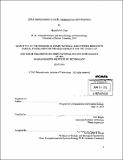DNA methylation in early mammalian development
Author(s)
Chan, Michelle M. (Michelle Mei Wah)
DownloadFull printable version (11.27Mb)
Alternative title
Deoxyribonucleic acid methylation in early mammalian development
Other Contributors
Massachusetts Institute of Technology. Computational and Systems Biology Program.
Advisor
Aviv Regev.
Terms of use
Metadata
Show full item recordAbstract
All the cells in the body contain the same genome yet showcase drastically different phenotypes. This is the result of different transcriptional programs, which are partly controlled by epigenetic modifications, including DNA methylation. In this thesis, I analyze genome-scale DNA methylation profiles across pre-implantation development to identify the targets and characterize the dynamics of global demethylation that lead to totipotency and the subsequent changes to embryonic specification. In Chapter 1, I validate and refine the decades old model for DNA methylation in mouse embryogenesis, identify many retrotransposons with active DNA methylation signatures at fertilization, and discover many, novel differentially methylated regions between the gametes that exist transiently during early development. Notably, the majority of epigenetic events unique to mammalian pre-implantation development are characterized in mouse. In Chapter 2, 1 describe the DNA methylation dynamics in human preimplantation development and show that the regulatory principles that operate in mouse are conserved, though some of their targets are species-specific and define regions of local divergence. Finally, in Chapter 3, I compare DNA methylation dynamics of fertilization to an artificial reprogramming process, somatic cell nuclear transfer, in mouse, and find that most dynamics are conserved but occur at a smaller magnitude after artificial reprogramming. I conclude this thesis with a summary of the chapters and a brief discussion of ongoing and future work.
Description
Thesis (Ph. D.)--Massachusetts Institute of Technology, Computational and Systems Biology Program, 2013. Cataloged from PDF version of thesis. Includes bibliographical references.
Date issued
2013Department
Massachusetts Institute of Technology. Computational and Systems Biology ProgramPublisher
Massachusetts Institute of Technology
Keywords
Computational and Systems Biology Program.